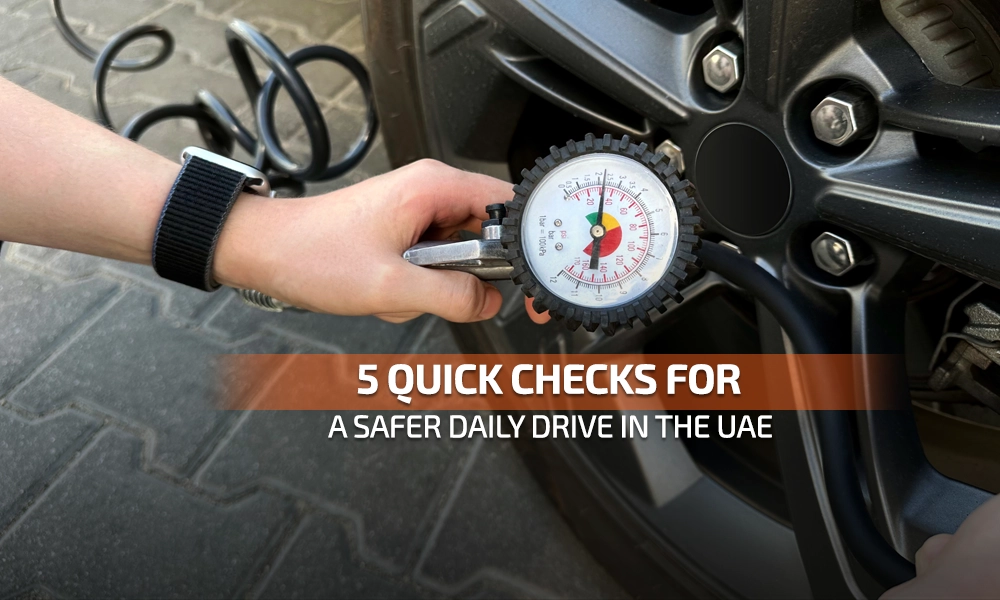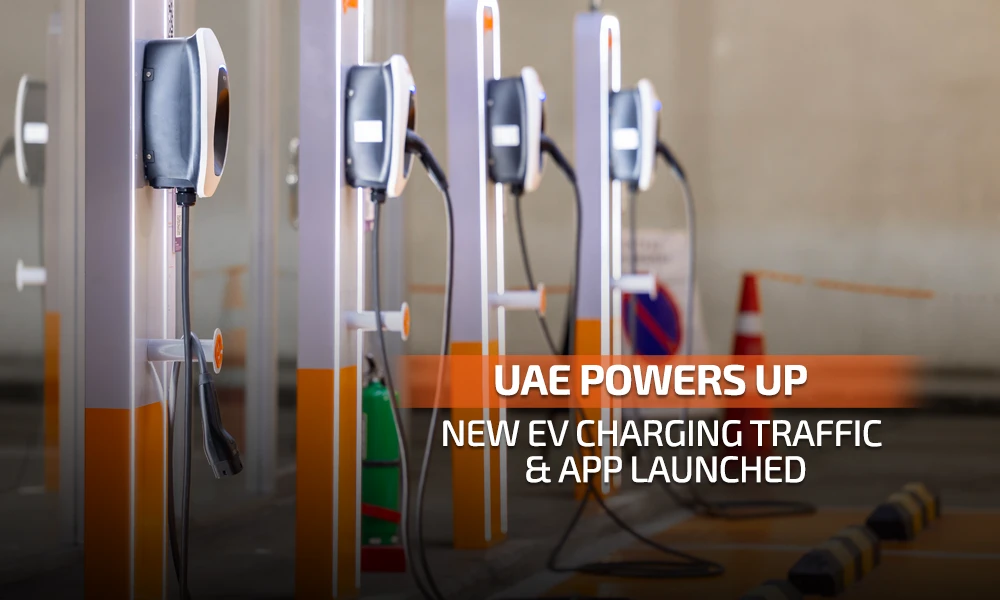We’ve all had that moment—you’re about to head out on Sheikh Zayed Road or Al Wahda Street, and a little voice in your head asks: “Did I check everything in my car?” Honestly, I’ve been there more than once. Between busy mornings, work stress, and endless traffic, it’s easy to forget the basics. But here’s the truth: the difference between a smooth daily drive and an unexpected roadside problem often comes down to a few simple checks.
When I was preparing for my driving test in Dubai, my instructor kept reminding me, “Car safety is as important as driving skills.” Back then, I thought it was just about passing. But now, years later, I realize he was right—those small checks save lives, money, and a lot of stress.
So, in this blog, let’s walk step by step through 5 quick checks you should do before hitting the road in the UAE. Whether you’re fresh from your driving test or a seasoned driver, these habits will keep you—and everyone else—safer on the road.
Step 1: Tire Pressure & Condition — Your First Line of Defense
Your tires are literally what keep you connected to the road. A flat or under‑inflated tire doesn’t just slow you down; it puts your life at risk.
What to check:
- Tire pressure (recommended PSI is in your car manual or door frame)
- Any cracks, bulges, or worn‑out tread
- Spare tire condition
When I ignored tire pressure once during a late‑night drive to Abu Dhabi, I ended up stranded on the highway. Not fun. Since then, I check them weekly.
Pro Tip: Many petrol stations in Dubai and Sharjah offer free tire pressure checks—make use of them. If you’re preparing for your driving test, practicing this habit will score you major safety points.
Step 2: Seatbelts & Airbags — The Silent Protectors
It sounds basic, but seatbelts are often taken for granted. According to UAE regulations, all passengers must wear seatbelts. Skipping this simple step can mean fines—and far worse.
Your checklist:
- Buckle up before ignition
- Ensure child seats are properly installed
- Airbag indicator should be off (flashing light = get it checked)
During my driving test, the examiner gave me a stern look when I forgot to check the rear passengers’ seatbelts. Lesson learned: safety isn’t optional.
Step 3: Lights, Signals & Mirrors — Your Eyes on the Road
From foggy mornings in Ras Al Khaimah to late‑night Dubai drives, good visibility is key.
Check before every drive:
- Headlights, brake lights, and hazard lights
- Indicators and side mirrors for cracks or dirt
- Adjust your mirrors for clear blind‑spot coverage
Once, I almost missed a lane‑change warning because of a dirty side mirror. Since then, a quick wipe before driving is part of my daily routine.
If you’re still preparing for your driving test, remember: failing to signal is one of the top reasons candidates lose points.
Step 4: Brakes & Fluids — Don’t Wait for a Scare
Your brakes are your lifeline in UAE’s fast‑paced traffic. Never assume they’re fine—test them.
What to look for:
- Press brakes gently before leaving—should feel firm, not spongy
- Check fluid levels: brake, engine oil, coolant, windshield washer
- Look under your car for leaks
When I skipped a brake check once, I discovered a fluid leak only after a near‑miss at a roundabout. Since then, fluids are non‑negotiable.
For new drivers, inspectors often ask about brake response during a driving test, so get used to making this a habit.
Step 5: Salik, Documents & Emergency Kit — Be Legally Ready
In the UAE, being road‑ready isn’t just about the car—it’s about compliance.
Make sure you have:
- Salik tag with balance (AED 50 top‑up recommended)
- Valid Emirates ID, license, and registration card
- Emergency kit: first‑aid box, warning triangle, flashlight, water
When I once forgot to top up Salik before a Dubai‑to‑Sharjah commute, I got an SMS fine before I even reached home. Not pleasant.
If you’re about to take your driving test, keep in mind that officials often stress the importance of emergency preparedness.
Why These Checks Matter Every Day
Driving in the UAE is exciting—but also demanding. Highways are fast, traffic is dense, and weather can shift quickly. These 5 daily checks give you peace of mind, prevent fines, and protect your loved ones.
From my experience, the more you treat these checks as part of your daily routine, the less stressful driving becomes. Just like practicing for your driving test, consistency builds confidence.
FAQs About Daily Driving Safety in the UAE
A: Yes. Even a 2‑minute check can save you from breakdowns or accidents. Think of it like your daily driving test—a quick routine that ensures both safety and compliance.
A: At least once a week. Heat in the UAE can cause pressure changes. Many petrol stations offer free checks, so there’s no excuse to skip it.
A: While not legally required in all cases, it’s strongly recommended. A first‑aid kit, warning triangle, and flashlight are lifesavers in emergencies—and inspectors often encourage them during the driving test process.
A: Neglecting seatbelts and mirrors. Many drivers relax after passing their driving test, but daily checks keep you consistent and safe.
A: In addition to the 5 daily checks, inspect coolant levels, AC efficiency, and Salik balance. For road trips to Fujairah or Ras Al Khaimah, make sure your spare tire and tools are in good condition.
Why These Safety Habits Stick
When I first passed my driving test, I thought safety checks were just exam requirements. But over time, I realized they’re a lifestyle—especially on UAE roads.
From tire pressure to Salik balance, these simple checks give you confidence every time you turn the key. And trust me, once you make them a habit, driving in the UAE becomes less stressful and far more enjoyable.
So, tomorrow before you drive, think of it this way: Every day is a mini driving test—pass it, and you pass safely.
Whether you’ve just passed your driving test or have been cruising the UAE highways for years, safety is always step one.
To recap:
- Check tires for pressure & wear
- Always buckle up and confirm airbags
- Test lights & mirrors for visibility
- Check brakes & fluids before leaving
- Keep documents & Salik ready
Driving safely isn’t just about following rules—it’s about protecting lives, including your own. And trust me, these five minutes of checks each day are worth far more than the hours of stress they save.
So tomorrow morning, before you start your engine, ask yourself: “Have I done my 5 quick checks?”
Because in the UAE, safety isn’t optional—it’s your daily responsibility.







